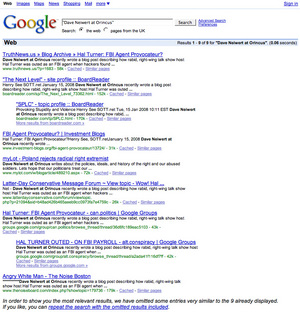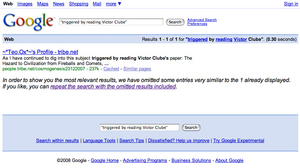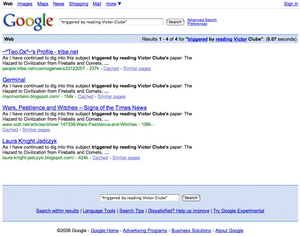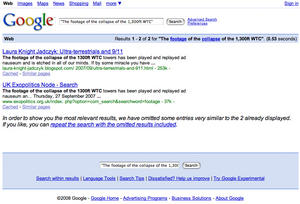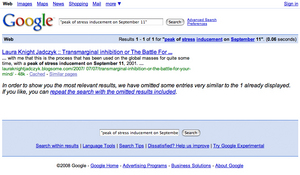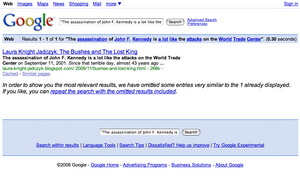Now let's look a little more closely at the interval of three years that Quigley suggests "is of some significance". The description given by Quigley of the removal of Lord Northcliffe from The Times hardly does justice to the story. The fight between Steed and Northcliffe is described in great detail by Douglas Reed in his book The Controversy of Zion. After explaining that with the easing of the censors after WWI, the free press reporting the actual facts on the ground in Palestine were the worst enemies of the Zionists, Reed describes how the most prominent of those enemies in Great Britain was taken off the scene:
At that stage in the affair England was of paramount importance to. the conspirators (I have shown that Dr. Weizmann and Mr. House both used this word) and in England the energetic Lord Northcliffe was a powerful man. The former Alfred Harmsworth, bulky and wearing a dank Napoleonic forelock, owned the two most widely read daily newspapers, various other journals and periodicals, and in addition was majority proprietor of the most influential newspaper in the world, at that time, The Times of London. Thus he had direct access to millions of people each day and, despite his business acumen, he was by nature a great newspaper editor, courageous, combative and patriotic. He was sometimes right and sometimes wrong in the causes he launched or espoused, but he was independent and unpurchasable. He somewhat resembled Mr. Randolph Hearst and Colone1 Robert McCormick in America, which is to say that he would do many things to increase the circulation of his newspapers, but only within the limits of national interest; he would not peddle blasphemy, obscenity, libel or sedition. He could not be cowed and was a force in the land.
Lord Northcliffe made himself the adversary of the conspiracy from Russia in two ways. In May 1920 he caused to be printed in The Times the article, previously mentioned, on the Protocols. It was headed, "The Jewish Peril, A Disturbing Pamphlet, Call for Enquiry". It concluded, "An impartial investigation of these would-be documents and of their history is most desirable . . . are we to dismiss the whole matter without inquiry and to let the influence of such a book as this work unchecked?"
Then in 1922 Lord Northcliffe visited Palestine, accompanied by a journalist, Mr. J.M.N. Jeffries (whose subsequent book, Palestine: The Reality, remains the classic work of reference for that period). This was a combination of a different sort from that formed by the editors of The Times and Manchester Guardian, who wrote their leading articles about Palestine in England and in consultation with the Zionist chieftain, Dr. Weizmann. Lord Northcliffe, on the spot, reached the same conclusion as all other impartial investigators, and wrote, "In my opinion we, without sufficient thought, guaranteed Palestine as a home for the Jews despite the fact that 700,000 Arab Moslems live there and own it . . . The Jews seemed to be under the impression that all England was devoted to the one cause of Zionism, enthusiastic for it in fact; and I told them that this was not so and to be careful that they do not tire out our people by secret importation of arms to fight 700,000 Arabs. . . There will be trouble in Palestine. . . people dare not tell the Jews the truth here. They have had some from me".
By stating this truth, Lord Northcliffe offended twice; he had already entered the forbidden room by demanding "inquiry" into the origins of the Protocols. Moreover, he was able to publish this truth in the mass-circulation newspapers owned by him, so that he became, to the conspirators, a dangerous man. He encountered one obstacle in the shape of Mr. Wickham Steed, who was editor of The Times and whose championship of Zionism Dr. Weizmann records.
In this contest Lord Northcliffe had an Achilles heel. He particularly wanted to get the truth about Palestine into The Times, but he was not sole proprietor of that paper, only chief proprietor. Thus his own newspapers published his series of articles about Palestine but The Times, in fact, refused to do so. Mr. Wickham Steed" though he had made such large proposals about the future of Palestine, declined to go there, and denied publicity to the anti-Zionist case.
These facts, and all that now follows, are related (again, with surprising candour) in the Official History of The Times (1952). It records that Mr. Wickham Steed "evaded" visiting Palestine when Lord Northcliffe requested him to go there; it also records Mr, Wickham Steed's "inaction" following Lord Northcliffe's telegraphed wish "for a leading article attacking Balfour's attitude towards Zionism".
In what follows the reader' s attention is particularly directed to dates.
In May 1920 Lord Northcliffe had caused publication of the article about the Protocols in The Times. Early in 1922 he visited Palestine and produced the series of articles above mentioned. On February 26, 1922 he left Palestine, after his request, which was ignored, to the editor of The Times. He was incensed against the incompliant editor and had a message, strongly critical of his editorial policy, read to an editorial conference which met on March 2, 1922. Lord Northcliffe wished that Mr. Wickham Steed should resign and was astonished that he remained after this open rebuke. The editor, instead of resigning, decided "to secure a lawyer's opinion on the degree of provocation necessary to constitute unlawful dismissal". For this purpose he consulted Lord Northcliffe's own special legal adviser (March 7, 1922), who informed Mr. Wickham Steed that Lord Northcliffe was "abnormal", "incapable of business" and, judging from his appearance, "unlikely to live long" and advised the editor to continue in his post! The editor then went to Pau, in France, to see Lord Northcliffe, in his turn decided that Lord Northcliffe was "abnormal" (March 31, 1922), and informed a director of The Times that Lord Northcliffe was "going mad".
The suggestion of madness thus was put out by an editor whom Lord Northcliffe desired to remove and the impressions of others therefore are obviously relevant. On May 3, 1922 Lord Northcliffe attended a farewell luncheon in London for a retiring editor of one of his papers and "was in fine form". On May 11, 1922 he made "an excellent and effective speech" to the Empire Press Union and "most people who had thought him 'abnormal' believed they were mistaken". A few days later Lord Northcliffe telegraphed instructions to the Managing Director of The Times to arrange for the editor's resignation. This Managing Director saw nothing "abnormal" in such an instruction and was not "in the least anxious about Northcliffe's health". Another director, who then saw him, "considered him to have quite as good a life risk as his own"; he "noticed nothing unusual in Northcliffe's manner or appearance" (May 24, 1922).
On June 8,1922 Lord Northcliffe, from Boulogne, asked Mr. Wickham Steed to meet him in Paris; they met there on June 11, 1922, and Lord Northcliffe told his visitor that he, Lord Northcliffe, would assume the editorship of The Times. On June 12,1922 the whole party left for Evian-les-Bains, a doctor being secreted on the train, as far as the Swiss frontier, by Mr. Wickham Steed. Arrived in Switzerland "a brilliant French nerve specialist" (unnamed) was summoned and in the evening certified Lord Northcliffe insane. On the strength of this Mr. Wickham Steed cabled instructions to The Times to disregard and not to publish anything received from Lord Northcliffe, and on June 13, 1922 he left, never to see Lord Northcliffe again. On June 18, 1922 Lord Northcliffe returned to London and was in fact removed from all control of, and even communication with his undertakings (especially The Times; his telephone was cut). The manager had police posted at the door to prevent him entering the office of The Times if he were able to reach it. All this, according to the Official History, was on the strength of certification in a foreign country (Switzerland) by an unnamed (French) doctor. On August 14, 1922 Lord Northcliffe died; the cause of death stated was ulcerative endocarditis, and his age was fifty-seven. He was buried, after a service at Westminster Abbey, amid a great array of mourning editors.
Such is the story as I have taken it from the official publication. None of this was known outside a small circle at the time; it only emerged in the Official History after three decades, and if it had all been published in 1922 would presumably have called forth many questions. I doubt if any comparable displacement of a powerful and wealthy man can be adduced, at any rate in such mysterious circumstances.
For the first time, I now appear in this narrative as a personal witness of events. In the 1914-1918 war I was one participant among uncomprehending millions, and only began to see its true shape long afterwards. In 1922 I was for an instant in, though not of the inner circle; looking back, I see myself closeted with Lord Northc1iffe (about to die) and quite ignorant of Zionism, Palestine, Protocols or any other matter in which he had raised his voice. My testimony may be of some interest; I cannot myself judge of its value.
I was in 1922, a young man fresh from the war who struggled to find a place in the world and had become a c1erk in the office of The Times. I was summoned thence, in that first week of June when Lord Northc1iffe was preparing to remove Mr. Wickham Steed and himself assume the editorship of The Times, to go as secretary to Lord Northc1iffe who was at Boulogne. I was warned beforehand that he was an unusual man whose every bidding must be quickly done. Possibly for that reason, everything he did seemed to me to be simply the expression of his unusual nature. No suspicion of anything more ever came to me, a week before he was "certified" and, in effect, put in captivity.
I was completely ignorant of "abnormal" Conditions, so that the expert might discount my testimony. Anyway, the behaviour I observed was just what I had been told to expect by those who had worked with him for many years. There was one exception to this. Lord Northcliffe was convinced that his life was in danger and several time said this; specifically, he said he had been poisoned. If this is in itself madness, then he was mad, but in that case many victims of poisoning have died of madness, not of what was fed to them. If by any chance it was true, he was not mad. I remember that I thought it feasible that such a man should have dangerous enemies, though at that time I had no inkling at all of any particular hostility he might have incurred. His belief certainly charged him with suspicion of those around him, but if by chance he had reason for it, then again it was not madness; if all this had transpired in the light of day such things could have been thrashed out.
I cannot judge, and can only record what I saw and thought at the time, as a young man who had no more idea of what went on around him than a babe knows the shape of the world. When I returned to London I was questioned about Lord Northcliffe by his brother, Lord Rothermere, and one of his chief associates, Sir George Sutton. The thought of madness must by that time have been in their minds (the "certification" had ensued) and therefore have underlain their questions, but not even then did any such suspicion occur to me, although I had been one of the last people to see him before he was certified and removed from control of his newspapers. I did not know of that when I saw them or for long afterwards. In such secrecy was all this done that, although I continued in the service of The Times for sixteen years, I only learned of the "madness" and "certification" thirty years late , from the Official History. By that time I was able to see what great consequences had flowed from an affair in which I was an uninitiated onlooker at the age of twenty-seven.
Lord Northcliffe therefore was out of circulation, and of the control of his newspapers, during the decisive period preceding the ratification of "the mandate" by the League of Nations, which c1inched the Palestinean transaction and bequeathed the effects of it to our present generation: The opposition of a widely-read chain of journals at that period might have changed the whole course of events. After Lord Northcliffe died the possibility of editorials in The Times "attacking Balfour's attitude towards Zionism" faded. From that time the submission of the press, in the manner described by the Protocols, grew ever more apparent and in time reached the condition which prevails today, when faithful reporting and impartial comment on this question has long been, in suspense.
Lord Northcliffe was removed from control of his newspapers and put under constraint on June 18, 1922; on July 24, 1922 the Council of the League of Nations met in London, secure from any possibility of loud public protest by Lord Northcliffe, to bestow on Britain a "mandate" to remain in Palestine and by arms to instal the Zionists there (I describe what events have shown to be the fact; the matter was not so depicted to the public, of course).
After reading the above account, I think you will agree that it throws an interesting light on the web we have been untangling that begins with Rhodes' 'vast semi-religious, quasi-political association'.
I note, as well, that the World Zionist Congress was also begun in the same decade as Rhodes' Society of the Elect. Coincidence?

